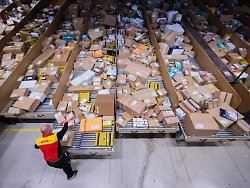Friday October 22, 2021
Outlook on Christmas business
Post does not dare to make a record forecast
Even if business is booming: Deutsche Post is not expecting big leaps in this year’s Christmas business. Although the Bonn-based company is not posting record parcel volumes – so that it runs smoothly, the group is still relying on more staff and more vans.
61.3 million: Deutsche Post DHL transported more parcels from December 14 to 19, 2020 – more than ever before in a week. “That was ten percent more than what we thought was our maximum capacity at the time,” recalls Tobias Meyer, the board member responsible for Post and Parcel Germany. At that time, stationary shops were closed in mid-December due to Corona, and online orders skyrocketed.
The closings in retail are unlikely to repeat themselves in 2021 – this is another reason why the company does not expect large jumps in parcel volumes in this year’s Christmas business. After there was an exceptionally strong plus of almost a quarter (plus 23.3 percent) in the fourth quarter of 2020, the high level of the previous year will be maintained and possibly slightly exceeded, says Meyer. “We expect very strong Christmas business again, but it will not take place in the extraordinary situation like 2020.”
There is a similar reluctance among competitors. The previous year was so strong that it is now difficult to compare it, says an industry expert who does not want to be named. DHL competitor Hermes, however, recently presented an astonishingly optimistic forecast: The company estimates that its vehicles in Germany will transport 9 percent more shipments in the fourth quarter than in the same period last year. Although this is less than the 20 percent increase a year ago, it would still be a very good value.
Change in consumer behavior
Post group board member Meyer refers to imponderables that make it difficult to forecast this year. For example, some electronics manufacturers have delivery problems due to global semiconductor bottlenecks – so it could be that a little fewer electronics parcels are sent to DHL. And what will happen in the long term? Does the corona effect fizzle out in the parcel industry and demand falls because people are shopping more locally and less online?
The manager doesn’t think so. “The total lockdowns have brought about a lasting change in consumer behavior in certain segments,” he says. This applies to everyday items, such as medicines and animal feed. This demand remains high and will continue to grow. In the case of “impulse purchases” of fashion, for example, the demand in lockdown times and generally with high incidences has risen significantly – but such an increase in volume is only temporary.
For the first quarter of 2022 Meyer assumes a similarly high shipment level as at the beginning of this year or even a slight decrease, because lockdown effects were very strong in the first quarter of 2021. “But we are still convinced that there will be sustainable growth in the future too.”
Coping with the masses of parcels
From the perspective of Swiss Post, Corona has strengthened the trend towards online shopping so significantly that the previously usual growth in parcel volumes has skyrocketed from 5 to 7 percent annually to around 20 percent within a year – the temporary effects of the lockdown spontaneous purchases are factored out here. “Corona has greatly accelerated development,” says Meyer.
Even if the Bonn-based company is not posting record volumes in this year’s Christmas business – it will still be large volumes of mail that they will be transporting. In the end of 2020, the yellow parcel carriers delivered almost 500 million shipments. To ensure that things run smoothly, the group is again relying on more staff and more vans: around 10,000 temporary workers will be deployed this year’s Christmas business, roughly the same as in 2020.
Overall, this means that more workers are available to cope with the mass of parcels, because around 7,000 new full-time positions were created in the parcel area this year. And: In addition to the normal vehicle fleet, 13,000 additional vehicles will be on the road for Deutsche Post DHL in transport and domestic deliveries over the next two months.
Post parcels as early as possible
A key issue in the logistics industry is CO2 emissions: Swiss Post and its competitors are also increasingly turning to electric vehicles to counter criticism of the high volume of traffic in city centers. There has been significant progress in terms of sustainability, says Meyer. In the meantime, much more electric cargo bikes are being used. At the end of the year, the number of e-trikes that are being delivered will be around 11,000 – 3000 more than at the end of 2020. In addition, 17,400 street scooters would be in use at the end of the year, after 14,000 electric vans a year earlier.
In view of the high volume of shipments during the Christmas season, parcel service providers advise consumers to post parcels as early as possible. In order for a gift within Germany to be under the Christmas tree in time, it should be handed in by December 20th at the latest – Deutsche Post and Hermes recommend this. If the delivery takes place later, it will probably only reach the addressee after the holidays.
